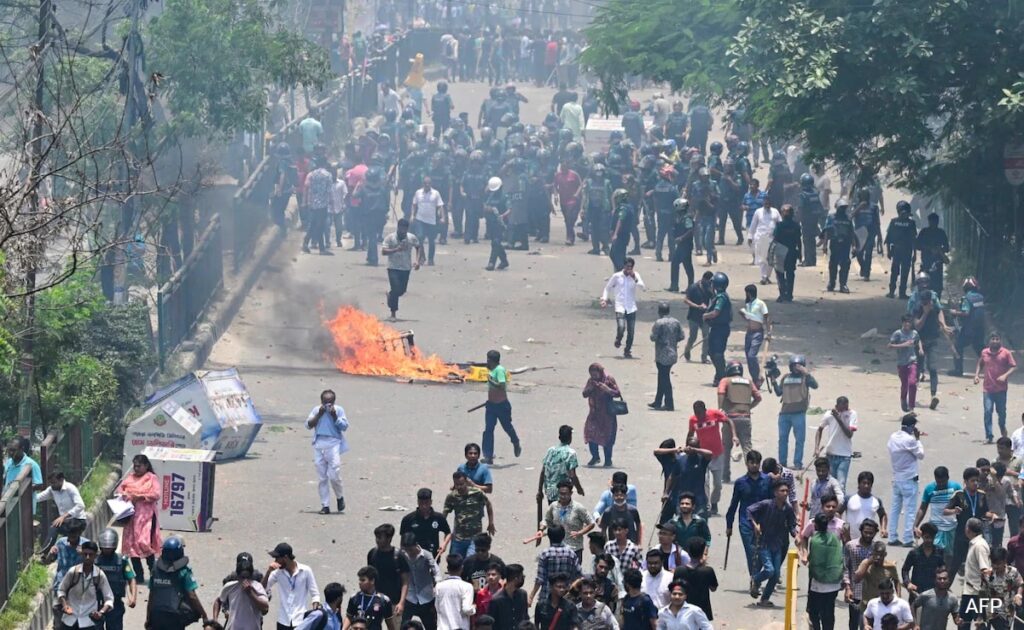Dhaka:
Bangladeshi students set fire to the country’s national broadcasting building on Thursday, a day after Prime Minister Sheikh Hasina appeared on the national broadcaster to try to defuse escalating clashes that have left at least 32 people dead.
Hundreds of protesters demanding reforms to civil service hiring rules fought back, overwhelming riot police who opened fire with rubber bullets.
Enraged crowds chased the retreating police to BTV headquarters in the capital, Dhaka, before setting fire to the BTV reception building and dozens of vehicles parked outside.
The department said in a Facebook post that “many people” were trapped inside the building as the fire spread, but a department official later told AFP that people had been evacuated from the building to safety.
“The fire is still burning,” the official said. “We have come out to the main gate. The airwaves have been suspended for now.”
Hasina’s government has ordered schools and universities to close indefinitely as police intensify efforts to control the country’s deteriorating security situation.
Appearing on the station on Wednesday night, the prime minister condemned the “murder” of protesters and vowed that those responsible would be punished, regardless of their political affiliation.
But despite her calls for calm, violence on the streets worsened as police again tried to break up protests with a barrage of rubber bullets and tear gas.
“Our first demand is for the prime minister to apologise to us,” protester Bidisha Rimjhim told AFP.
“Secondly, justice must be ensured for our murdered compatriots,” she added.
At least 25 people were killed on Thursday, following seven deaths earlier this week, and hundreds more were injured, according to hospital casualty figures compiled by AFP.
At least two-thirds of the dead were killed by police weapons, a hospital source told AFP.
“Seven people have died here,” a staff member at Dhaka’s Uttara Crescent Hospital, speaking on condition of anonymity for fear of retribution, told AFP.
“The first two were students who were wounded by rubber bullets. The other five sustained gunshot wounds.”
About 1,000 people injured in clashes with police were being treated in hospitals, the official added, many of them with wounds from rubber bullets.
Didar Malekin of the Dhaka Times online news outlet told AFP that one of its journalists, Mehedi Hasan, was killed while covering clashes in the city.
Several cities across Bangladesh saw violence throughout the day as riot police marched towards protesters who had again launched human blockades on roads and highways.
Dhaka’s elite Rapid Action Battalion said in a statement that helicopters had rescued 60 police officers who were trapped on the roof of a building on the Canadian University campus, the scene of some of the heaviest clashes on Thursday.
“They call her a dictator.”
The near-daily demonstrations this month have been calling for the end of a quota system that allocates more than half of civil service posts to certain groups, including the children of veterans from the 1971 war of independence with Pakistan.
Critics say the system benefits the children of pro-government groups that support President Hasina, 76, who has ruled the country since 2009 and won her fourth consecutive election victory in January this year without any real opposition.
Her government has been accused by human rights groups of seizing state institutions and suppressing dissent, including by committing extrajudicial killings of opposition activists.
Mubashar Hasan, a Bangladesh expert at the University of Oslo in Norway, said the protests had expanded into a broader expression of dissatisfaction with Hasina’s authoritarian rule.
“They are protesting against the repressive nature of the state,” he told AFP.
“The protesters are questioning Prime Minister Hasina’s leadership and accusing her of clinging to power by force,” he added. “In fact, the students are calling her a dictator.”
Mobile Internet Down
Bangladeshis reported widespread mobile internet outages across the country on Thursday, two days after internet providers cut off access to Facebook, a key organising platform for the protest movement.
Undersecretary for Communications Zunaid Ahmed Palak told reporters that the government had been forced to restrict access because social media was being “used as a means to spread rumours, lies and disinformation”.
In addition to the police crackdown, protesters and students affiliated with the prime minister’s ruling Awami League party also clashed in the streets, hurling bricks and bamboo sticks.
Human rights group Amnesty International said video evidence of this week’s clashes showed Bangladeshi security forces used unlawful force.
(Except for the headline, this story has not been edited by NDTV staff and is published from a syndicated feed.)
Today’s Featured Video
How Usha Vance met Donald Trump’s VP candidate husband, J.D. Vance, at Yale University



